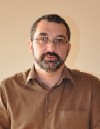KEYNOTE SPEAKERS
 John Domingue
John Domingue
Email: j (dot) b (dot) domingue (at) open (dot) ac (dot) uk
Organization: The Knowledge Media Institute, The Open University,
http://kmi.open.ac.uk/
Phone: +44 (0)1908 655014
Homepage:
http://kmi.open.ac.uk/people/domingue/
John Domingue is the
Deputy Director of the Knowledge Media Institute
at The Open University and the President of STI International, a
semantics focused networking organization with just under 50 members.
He has published over 150 refereed articles in the areas of Artificial
Intelligence and the Web and his current work is focused on how
semantic technology can automate the management, development and use
of Web services. Currently he serves as the Scientific Director of
SOA4All a 13M Euro project which aims at creating a Web of billions of
services. Within the Future Internet arena he helps coordinate the
Future Internet Service Offer Working Group within the Future Internet
Assembly – a collaboration of 100 European projects with a combined
budget of over 600M Euros aiming to develop a next-generation
Internet. Prof. Domingue is also serves on the editorial boards for
the Journal of Web Semantics and the Applied Ontology Journal.
Keynote talk - Semantic Web Services as a Core Component of the Future Internet
Globally, several major initiatives are currently underway to re-design the Internet meet
the economic and societal demands of the 21st Century. Japan, USA and Europe are investing
heavily in this area. The EU is shaping around the idea of the Future Internet
(www.future-internet.eu)
for its research programmes for the Seventh Framework Programme and beyond based upon:
- Internet of Things, where every electronic device will be an active participant in the network;
- Internet of Services, where applications live in the network, and data becomes an active entity;
- Internet of Content and Media, including new technologies for media content provision and where
most of the content is generated by end-users.
Following discussions within the EU Future Internet Assemblies (e.g. see
www.fi-stockholm.eu and
www.r2sconference.eu/sideEvents_fia.php
) and from the emerging results of EU projects such as SOA4All
(www.soa4all.eu) it is
apparent that a key part of the next generation global
network infrastructure will rely on semantic and Web service technologies. In this talk
I will outline the main role that semantic and Web service technologies will play giving
examples from a number of running EU projects.
 Thore Graepel
Thore Graepel
Email: thoreg (at) microsoft (dot) com
Organization: Microsoft Research, Cambridge, UK
http://research.microsoft.com/en-us/
Phone: +44 (0)1223 479 759
Fax: +44 (0)1223 479 999
Homepage:
http://research.microsoft.com/en-us/people/thoreg/
Thore Graepel is a senior researcher at Microsoft Research Cambridge (MSRC), UK, and heads the
Online Services and Advertising (OSA) research group. The OSA group conducts research in the
area of applied machine learning with applications to online advertising, online gaming,
and web search. A common theme of Thore's research is the idea of using the tremendous wealth
of data Microsoft is generating through its services to improve those services based on
data-driven computational intelligence. Thore's research has impacted Microsoft products
and services, e.g. through the TrueSkill ranking and matchmaking system in Xbox Live and
Halo 3, as well as through his work with adCenter on the prediction of user behaviour.
Before starting the OSA group together with Ralf Herbrich, Thore co-founded the Applied
Games group at MSRC whose research is aimed at bringing adaptable artificial intelligence
to computer games. Thore has a strong academic track record with over 50 peer-reviewed
publications in machine learning and probabilistic modelling. His basic research focuses
on inference in large scale probabilistic models and knowledge bases. He is also interested
in classification and recommender systems, and is passionate about creating a computer
program that plays the game of Go better than the best human players.
Keynote talk - Learning to Play: Machine Learning and Computer Games
In the Applied Games group at Microsoft Research Cambridge we are working on the
application of machine learning to computer games. I will talk about the motivation for this
work and describe three projects in more detail. In the Drivatars project our team built the
driving AI for the commercial racing game Forza Motorsport for Xbox. What sets this AI system
apart is its ability to learn the driving style of each individual gamer through the
application of machine learning methods and provide a "cloned" AI driver that mimics
the player's style in game. In the Tao Feng project, we applied the paradigm of reinforcement
learning to train an AI system to be able to compete in a fighting game. The system learns to
fight by playing against the built-in AI and by adapting its policy from observed state-action-reward
sequences. Finally, in the TrueSkill project, we addressed the problem of estimating the
skills of gamers in particular games or game modes to be able to match them into balanced,
fair, and fun online matches. TrueSkill is based on a principled Bayesian modelling
approach and can be viewed as a generalization to the Chess rating system ELO to the
multi-player/multi-team scenario.
 Atanas Kiryakov
Atanas Kiryakov
Email: naso.at.sirma.bg
Organization: Ontotext AD, Sirma Group, 135 Tsarigradsko Chausse, Sofia 1784, Bulgaria,
http://www.ontotext.com/
Phone: (+359 2) 8091 555
Fax: (+359 2) 8091 426
Atanas Kiryakov is the founder and CEO of
Ontotext AD. Ontotext is a leading provider of core
semantic technology, distinctive for its performance, scale, and compliance with open standards.
Kiryakov joined Sirma as a software engineer in 1993 and later on became partner and member of
the board. In year 2000 he found Ontotext lab. He led Ontotext in research projects with total
budget above 100 MEuro that allowed it to invest more than 150 man-years in product development.
In 2008 Kiryakov finalized an investment deal for Ontotext for 2.5M EURO, under which the
VC fund NEVEQ acquired a minority share.
Keynote talk -
FactForge – the Fast Track to the Centre of the Data Web
or How reason-able views bring the Semantic Web closer to its tipping point
"Linked data" is a principle for publishing RDF data which allows those to be
interlinked and traversed across servers – this way forming a Web of data.
LOD is a
W3C SWEO Community Project, which aims to facilitate the emergence of a Web of
linked data by means of publishing and interlinking open data. Currently LOD
includes more than 50 datasets which contain more than 10 billion statements.
Despite the enthusiasm about them the usage of linked data in real-world applications
and in the enterprises is still quite low. The main challenges for the adoption of the
linked data are that: LOD is hard to comprehend and queried as structured data; it is
generally unreliable and inconsistent; querying data distributed across several
servers on the Web is slow.
The so-called reason-able views make it easier to use part of the LOD data for
specific purposes. Technically to build a reasonable-view one should clean
up and integrate selected datasets and ontologies in a compound dataset,
which is loaded in a single semantic repository.
FactForge is a reason-able view which
includes 8 of the central LOD datasets
with total size 1.2 billion explicit. OWL Horst reasoning is performed to
"materialize" 0.8 billion facts that could be inferred from these data, while
the total number of retrievable statements is 10 billion. FactForge is the only
system which provides a solution to the
Modigliani test, defined at ReadWriteWeb
as the tipping point of the Semantic Web.
Copyright © 2003-2025 Institute of Information Technologies. All rights reserved.
Last update: 20.08.2010 webmaster:
 John Domingue
John Domingue Thore Graepel
Thore Graepel Atanas Kiryakov
Atanas Kiryakov